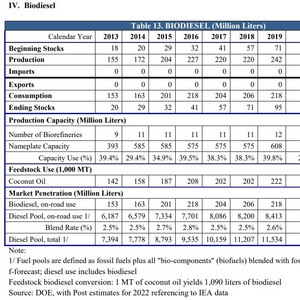Biodiesel consumption in the Philippines to increase in 2022

September 6, 2022
BY Erin Krueger
Biodiesel consumption in the Philippines is expected to expand by 31 percent in 2022, according to a report filed with the USDA Foreign Agricultural Service’s Global Agricultural Information Network. The increase is primarily attributed to a projected movement from B2 to B5 and increased fuel use due to economic growth.
The country currently has 13 biodiesel plants with a combined 708 million liters of nameplate capacity. Both the number of biorefineries and capacity has held steady since 2020. Capacity use is expected to be at 35 percent this year, up from 28 percent in 2021 and 26.6 percent in 2020.
Advertisement
Advertisement
Production is expected to reach 248 million liters this year, up from 191 million liters in 2021 and 161 million liters in 2020, Domestic biodiesel production currently relies on coconut oil feedstock, with 228,000 metric tons expected to be consumed this year.
The Philippines is expected to consume 250 million liters (66.04 million gallons) of biodiesel this year, up from 129 million liters in 2021 and 122 million liters in 2020. Biodiesel is expected to account for 3 percent of diesel fuel use this year, up from 2.6 percent in 2021 and 2.5 percent in 2020.
The Philippines is not expected to import or export any biodiesel in 2022.
Advertisement
Advertisement
To reach a target biodiesel blend of 5 percent, the report estimates that 683 million liters of the fuel will be needed next year, increasing to 717 million liters in 2024, 745 million liters in 2025 and 777 million liters in 2026.
A full copy of the report can be downloaded from the USDA FAS GAIN website.
Related Stories
The U.S. EPA on July 8 hosted virtual public hearing to gather input on the agency’s recently released proposed rule to set 2026 and 2027 RFS RVOs. Members of the biofuel industry were among those to offer testimony during the event.
The USDA’s Risk Management Agency is implementing multiple changes to the Camelina pilot insurance program for the 2026 and succeeding crop years. The changes will expand coverage options and provide greater flexibility for producers.
EcoCeres Inc. has signed a multi-year agreement to supply British Airways with sustainable aviation fuel (SAF). The fuel will be produced from 100% waste-based biomass feedstock, such as used cooking oil (UCO).
President Trump on July 4 signed the “One Big Beautiful Bill Act.” The legislation extends and updates the 45Z credit and revives a tax credit benefiting small biodiesel producers but repeals several other bioenergy-related tax incentives.
CARB on June 27 announced amendments to the state’s LCFS regulations will take effect beginning on July 1. The amended regulations were approved by the agency in November 2024, but implementation was delayed due to regulatory clarity issues.
Upcoming Events










